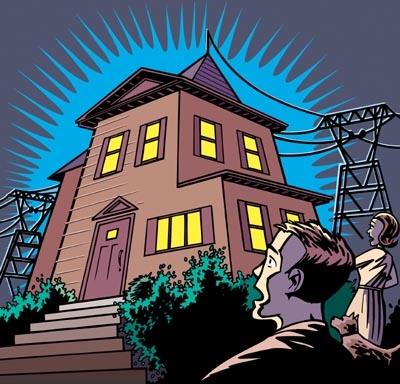POWERHOUSE

Let's face it: compared with lust-inducing gear like big-screen plasma TVs, feature-filled digital surround receivers, and 7.1-channel speaker systems, power accessories are about as sexy as dentistry. But if your house should ever get hit with a huge voltage surge, you might find having a tooth or two pulled a lot less painful than replacing your gear.
Many people still see power products as just another flavor of snake oil foisted on an unsuspecting, gullible public, but there are some good reasons for considering a surge protector, line conditioner, or battery backup for your home theater system. While computer users have become pretty savvy about protecting their PCs, home theater owners have only recently begun to be aware of the need to protect their systems, even though they have just as much - and often more - to lose.
The Perils of Power The Holy Trinity of power products - surge protectors, power-line conditioners, and uninterruptible power supplies - were created to deal with three basic problems: transient voltage surges and dips, dirty power lines, and power outages. The most destructive of these are power surges and spikes - short bursts of voltage that substantially exceed the home standard of 120 volts AC. Although "surge" and "spike" are often used interchangeably, a surge is a voltage increase lasting for 3 nanoseconds or more, while a spike lasts for less than 3 nanoseconds. If the surge is great enough, it can damage unprotected equipment in its path. (When I was 11, a lightning strike sent enough voltage into the garage to char my guitar amp and a world radio I'd won as a newspaper delivery boy.) At the other end of the worry spectrum are dips (or sags), which occur when the voltage drops below 120 volts, most commonly when the motor in a large appliance like a refrigerator or air conditioner kicks in.
Surges can be caused by violent weather disrupting the power from your local utility, a car accident knocking down poles and lines, or even the power company constantly shifting grids to keep up with the regional demand for electricity. The least common, but potentially most catastrophic, cause of surges is lightning strikes. Nothing can prevent your gear from frying if your house takes a direct hit, and even a strike a quarter-mile away can send damaging levels of voltage into your home. While the better outlet surge protectors can help, homes in lightning-prone areas often have "surge arrestors" wired to the main breaker panel. These can typically handle up to 20,000 volts, compared with the 6,000-volt limit of most outlet surge protectors, so they're good at dealing with surges between the local power company and your home.
One of the best ways to handle a lightning storm couldn't be cheaper: unplug your system. But only do this if you know a storm is approaching, not once it's in the area, since you then run the risk of being fried along with your gear. Since a surge protector can't save your gear from a direct or nearby strike, this simple step is still your best protection in a violent storm - provided, of course, that there's somebody around to do the unplugging.
Blackouts can also be a problem, especially for rear-projection TVs and front projectors, which have expensive lamps that need to be cooled by fans before they're turned off. Sudden outages also threaten gear like receivers and high-end multiroom systems that use PC-like microprocessors to save data and presets, and which should be shut down in stages, like a computer.
You should also be aware of electromagnetic interference (EMI) and radio-frequency interference (RFI), which can come from utility-company power lines, appliances like microwave ovens and hair dryers, and even your A/V gear. Although surges cause the most damage, some say that voltage sags, RFI, and EMI can reduce a component's life expectancy and cause snow or lines on TV screens, or mask soft sounds and mar detail and resolution in audio gear. Interference can also scramble system and component presets, or cause computers to freeze or crash.
- Log in or register to post comments
























































